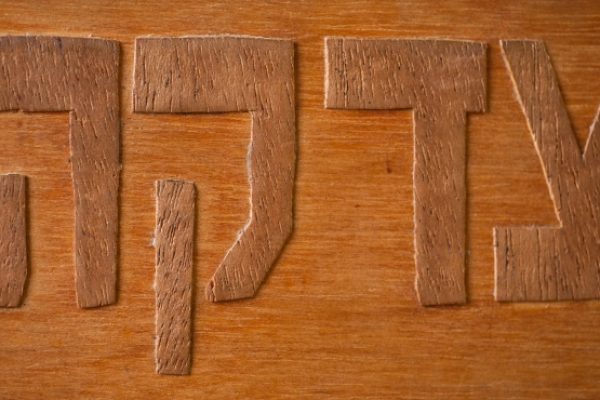In 1973, early in the history of Jewish feminism and the development of new Jewish rituals, Daniel and Myra Leifer, created a “Ceremony of Redemption and Hallowing of Our Daughter,” modeled on the pidyon haben (redemption of the firstborn son) ceremony. This ceremony arises with the commandment in Exodus 13: after the first-born of Egypt are slain in the tenth plague, “The Lord spoke further to Moses, saying, ‘Consecrate to Me every first-born…'” (Exodus 13:1–2) In gratitude for being spared the fate of the all the other first-born in Egypt, the Israelite first-born were to become priests serving in the Tabernacle. However, after the incident of the Golden Calf, the Levites are assigned to service in the Tabernacle, in place of the firstborn, although the firstborn’s obligation is not nullified: “The Lord spoke to Moses, saying: ‘I hereby take the Levites from among the Israelites in place of all the first-born… For every first-born is Mine: at the time that I smote every first-born in the land of Egypt, I consecrated every first-born in
Israel, ….'” (Numbers 3:11–13)
Traditional Jews therefore “redeem” the firstborn son from his obligation of Temple service. To “require” redemption, the baby must be his mother’s firstborn, not have been born by Caesarian section and neither parent be a Cohen or Levite (descendants of the Priestly families). During this ceremony, the father presents his son to a Cohen and then gives the Cohen five ceremonial silver shekels (the Bank of Israel mints special coins for this purpose), five silver dollars or the equivalent, in order to redeem the child. Although the Cohen is entitled to keep the money, he often donates it to tzedakah (charity) and may even return it to the family, if they are in need.
When the Leifers created their ceremony, they sought to include a female child in a ceremony that had only been the province of male children. However, many Jews today ignore the ceremony, even for their firstborn male children, or find it distasteful since they do not like the idea of redeeming their child from priestly service which, for all intents and purposes, no longer exists. In creating a ceremony for their daughter, the Leifers also addressed this issue (see below) arguing that the deeper meaning of the service, lay not in the child’s dedication to the Temple, but in the idea that children do not ultimately belong to their parents but are rather “on loan” from the Holy One. The Leifers’ ceremony thus serves as a model for both pidyon haben and pidyon ha-bat (female and male) ceremonies today. What follows is an excerpt from an article1 by the Leifers about their ceremony and the ceremony itself, adapted by ritualwell.org for either girl or boy babies.
About the Pidyon Habat
“Perhaps most important of all, in our efforts to celebrate the birth of our daughter with the same equality and dignity with which the birth of a son is traditionally celebrated, was our decision to have a pidyon habat, a redemption of our firstborn daughter…. Many have objected to the ceremony of pidyon haben because they no longer wish to maintain the distinctions and privileges of office of the Priests, Levites, and Israelites. While we subscribe to this point of view, to rest one ‘s opposition to the concept of pidyon – redemption – upon the role of the priest in the ceremony is sorely to misunderstand the nature of the religious ritual. The holiness acquired by firstborn males “at the time that I (God) smote every firstborn in the land of Egypt” (Num. 8:17) is the kedushah of life, a supplemental and extraordinary gift of hesed (loving-kindness) and redemption, bestowed by God when all other firstborn human life was annihilated. The “twice-born” sanctity of the firstborn is a result of joining kedushah from Nature with kedushah from History so characteristic of our tradition.
We wished to retain the awe and gratitude for a peter rehem (womb-opening) child which is reflected in the traditional ceremony. We also wished to emphasize, as does the traditional ceremony, the dedication of the parents to rear their child for a Jewish life of “Torah, huppah (marriage), and good deeds.” However, we wished to shift the latter emphasis to include the broad range of values, traditional Jewish and nontraditional Jewish and humanitarian values, with which we hoped to imbue our daughter. Thus we eliminated the role of the priests, and the five shekelim…. Instead we chose to donate a sum of eighteen dollars (the numerical value of the Hebrew letters of the word hai, life, is eighteen) in Ariel’s name to three Jewish and three non-Jewish organizations which are engaged in [causes that represent] values we affirm and hope to convey to her. In each case we sent a letter explaining the meaning and occasion of our contribution. (In almost all cases, we received warm letters in response — we are saving these for her.) We followed the traditional text and format of the ceremony; changing, adopting, adding so as to create what we hoped would be a ritual that took our tradition forward, unabused but invigorated…”
The Ceremony: Pidyon Habat/Haben (redemption of the first-born son or daughter)
1. Introduction
Mother reads a poem. Father explains origin of the ritual. Selected guests of honor read from some or all of the passages below.
|
And the Lord spoke to Moses, saying, And I, behold, I have taken the Levites from among the sons of Israel instead of all the firstborn who open the matrix among the people of Israel; therefore the Levites shall be mine; Because all the firstborn are mine; for on the day that I struck all the firstborn in the land of Egypt I consecrated to me all the firstborn in Israel, both man and beast; mine shall they be; I am the Lord. |
| —Numbers 3:11–13 |
|
And whatever is first ripe in the land, which they shall bring to the Lord, shall be yours; everyone who is clean in your house shall eat of it. Everything devoted in Israel shall be yours. Every thing that opens the womb in all flesh, which they bring to the Lord, whether it is of men or beasts, shall be yours; nevertheless the first born of man shall you surely redeem, and the firstling of unclean beasts shall you redeem. And those who are to be redeemed from a month old shall you redeem, according to your estimation, for the money of five shekels, according to the shekel of the sanctuary, which is twenty gerahs. |
| —Numbers 18:13–16 |
|
When Israel stood to receive the Torah, the Holy One said to them: “I am prepared to give you My Torah. Present to Me good guarantors that you will observe and study the Torah and I shall give it to you.” They said: “Our ancestors are our guarantors.” |
| —Shir ha-Shirim Rabbah 1, 24 |
|
You stand this day all of you before the Lord your God; your captains of your tribes, your elders, and your officers, with all the men of Israel, Your little ones, your wives, and your stranger who is in your camp, from the hewer of your wood to the drawer of your water; That you should enter into covenant with the Lord your God, and into his oath, which the Lord your God makes with you this day; That he may establish you today for a people to himself, and that he may be to you a God, as he has said to you, and as he has sworn to your fathers, to Abraham, to Isaac, and to Jacob. And not with you alone will I make this covenant and this oath; But with him who stands here with us this day before the Lord our God, and also with him who is not here with us this day; |
| —Deuteronomy 29: 9–14 |
2. The Ritual
A cup of wine and a loaf of challah are present.
Parents:
Zot biteynu (zeh bineynu) hi (hu) peter rekhem l’imah (l’imo). Kaddesh hi (hu) L’Adonay, kakatuv “kaddesh li khol b’khur peter kol rekhem bivney yisrael ba-adam u’va-b’heymah li hu” v’tov b’eyneynu lifdotah (lifdoto) v’hiney kesef pidyonah (pidyono) v’kidushah (v’kidusho).
This is our firstborn son/daughter. S/he opened, freed and liberated the womb of her/his mother. Holy is s/he to Adonai, as it is written, “Consecrate to Me every firstborn, man and beast, the first issue of every womb among the Israelites, is Mine.” (Ex. 13:1)
Now it is good in our eyes and our desire to redeem her/him. And here is the money of her/his redemption and hallowing.
Money is set aside for tzedakah in the name of the baby.
Parents:
בָּרוּךְ אַתָּה אֲדֹנָי אֱלֹהֵינוּ מֶלֶךְ הָעוֹלָם אֲשֶׁר קִדְּשָׁנוּ בְּמִצְוֹתָיו וְצִוָּנוּ לְהַכְנִיסָה (לְהַכְנִיסוֹ) בִּבְרִיתוֹ שֶׁל יִשְׂרָאֵל
Barukh attah Adonay, Eloheynu melekh ha-olam asher kidshanu b’mitzvotav v’tzivanu l’hakhnisah (l’hakhniso) biv’rito shel yisrael.
בְּרוּכָה אַתְּ יָהּ אֱלֹהֵינוּ רוּחַ הָעוֹלָם אֲשֶׁר קִדְּשָׁתְנוּ בְּמִצְוֹתֶיהָ וְצִוָּתְנוּ לְהַכְנִיסָה (לְהַכְנִיסוֹ) בִּבְרִיתוֹ שֶׁל יִשְׂרָאֵל
B’rukhah at Yah, Sh’khinah, Eloheynu ruakh ha-olam, asher kidshatnu b’mitzvoteha v’tzivatnu l’hakhnisah (l’hakhniso) biv’rito shel yisrael.
Praised are you, Adonai, our God, Lord of the Cosmos, who has made us holy through your Commandments and commanded us to bring our son/daughter into the covenant of the People of Israel.
בָּרוּךְ אַתָּה אֲדֹנָי אֱלֹהֵינוּ מֶלֶךְ הָעוֹלָם אֲשֶׁר קִדְּשָׁנוּ בְּמִצְוֹתָיו וְצִוָּנוּ עַל פִּדְיוֹן כָּל בְּכוּר פֶּטֶר רֶחֶם בִּבְנֵי יִשְׂרָאֵל
Barukh attah Adonay, Eloheynu melekh ha-olam asher kidshanu b’mitzvotav v’tzivanu al pidyon khol bakhur peter rekhem biv’ney yisrael.
Zeh takhat zot (zeh).Zeh khiluf zot (zeh).
Zeh makhul al zot (zeh).
V’tikanes zot ha-bat (v’yikanes zeh ha-ben)_____________bat/ben_______________l’hayim, l’torah, ul’yirat shamayim.
This tzedakah instead of this child, this in exchange of that, this money redeems this first born. May this son/daughter, __________ son/daughter of _____ and __________, enter into Life, Torah and the awe of the Divine. May it be God’s will that just as s/he has entered into Redemption, so may s/he enter into the study of Torah, the marriage canopy and into the doing of good deeds.
For a girl:
אֲחוֹתֵנוּ אַתְּ הֲיִי לְאַלְפֵי רְבָבָה
Akhoteynu at hayi l’alfei r’vavah.
O sister! May you grow into thousands of myriads (Gen 24:60).
May God make you as our Mothers Sarah, Rivka, Rachel and Leah.
Yismeikh Elohim k’sarah, rivkah, rachel, v’leah.
Y’vorekh Adonay v’yishmereikh
Yaer Adonay panav eilayikh vi’hunayikh
Yisa Adonay panav eilayikh v’yasem lakh shalom
For a boy:
יִשָּׂא אֲדֹנָי פָּנָיו אֵלֶיךָ וַיָּשֶׂם לְךָ שָׁלוֹם
Y’sm’kha Elohim k’efraim u-khim’nasheh.
Y’varekh’kha Adonay v’yishm’rekha.
Yaer Adonay panav eilekha vikhunekha.
Yisa Adonay panav eilekha v’yasem l’kha shalom.
Adonai bless you and keep you.
Adonai make his face to shine upon you and be gracious to you.
Adonai lift up his face to you and grant you peace.
Over wine:
בָּרוּךְ אַתָּה אֲדֹנָי אֱלֹהֵינוּ מֶלֶךְ הָעוֹלָם בּוֹרֵא פְּרִי הַגָפֶן
Barukh attah Adonay Eloheynu, melekh ha-olam borey p’ri ha-gafen.
בְּרוּכָה אַתְּ יָהּ אֱלֹהֵינוּ רוּחַ הָעוֹלָם בּוֹרֵאת פְּרִי הַגָפֶן
B’rukhah at Yah Eloheynu ruakh ha-olam boreyt p’ri ha-gafen.
Praised are you, Adonai, our God, Lord of the Cosmos, Creator of the fruit of the vine.
Over bread:
בָּרוּךְ אַתָּה אֲדֹנָי אֱלֹהֵינוּ מֶלֶךְ הָעוֹלָם הַמּוֹצִיא לֶחֶם מִן הָאָרֶץ
Barukh attah Adonay Eloheynu, melekh ha-olam ha-motzi lekhem min ha-aretz.
בְּרוּכָה אַתְּ יָהּ אֱלֹהֵינוּ רוּחַ הָעוֹלָם הַמּוֹצִיאָה לֶחֶם מִן הָאָרֶץ
B’rukhah at Yah Eloheynu ruakh ha-motziah lekhem min ha-aretz.
Praised are you, Adonai, our God, Lord of the Cosmos, who brings bread out of the earth.
The ceremony can conclude with an additional reading or song. One possibility is to create a unique acrostic for your child based on the letters of his/her name (see “Verses, Midrashim, and Acrostics“) The song, “On Children,” written by Kahlil Gibran and set to music by Sweet Honey in the Rock echoes many of the themes of this ritual. See “On Children” to read the lyrics and hear the music. The ceremony concludes with a festive meal.
————————-











